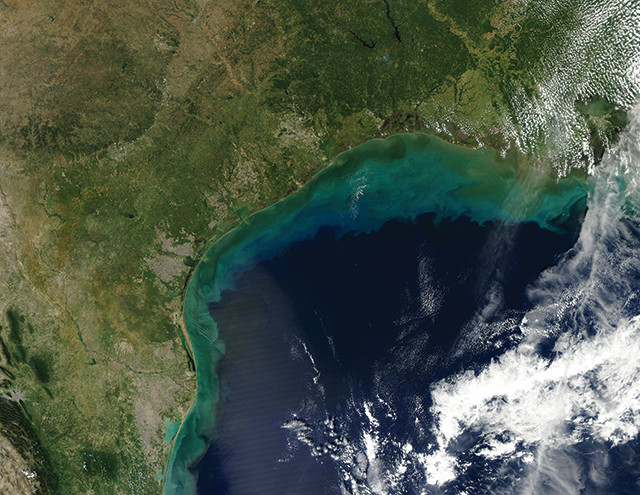
by Lucas Joel Thursday, May 19, 2016

Researchers found that phytoplankton abundances in the Gulf of Mexico were higher in the water column above naturally occurring oil and gas seeps than in nearby areas not above seeps. Credit: NASA.
The direct effects of oil and gas releases in the ocean are typically negative — as in the case of 2010’s Deepwater Horizon oil well disaster, which devastated marine ecosystems in the Gulf of Mexico. But scientists have now found that when natural oil and gas seeps upwell toward the ocean’s surface, they can also carry nutrients such as nitrates and nitrites from the seafloor that feed communities of phytoplankton, which flourish as a result.
Nigel D’souza, a postdoctoral researcher at Columbia University who is now at Georgia Tech, and his colleagues spotted the effects of the seeps on phytoplankton abundance while monitoring the fluorescence of chlorophyll compounds produced by phytoplankton in ocean surface waters during a shipboard survey of previously recognized seeps. The biggest impact on phytoplankton communities “was seen a few hundred feet deep in the water column, at the point where phytoplankton have enough light from above to still grow, and are receiving the most nutrients rising from below,” according to a press release accompanying the paper, published in Nature Geoscience. Specifically, the team found that chlorophyll concentrations above seeps were roughly twice as high as over nonseep sites.
It is not yet known which phytoplankton species are benefiting most from the seeps, or if some kinds of phytoplankton are also harmed by the oil. Still, “given the global abundance and distribution of offshore hydrocarbon seeps, these observations in the Gulf of Mexico probably reflect a worldwide phenomenon,” D’souza and his colleagues wrote.
© 2008-2021. All rights reserved. Any copying, redistribution or retransmission of any of the contents of this service without the expressed written permission of the American Geosciences Institute is expressly prohibited. Click here for all copyright requests.